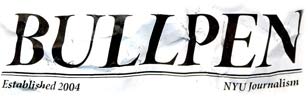Lecture: Anya Schiffrin
RELATED:
As a young Dow Jones reporter working abroad, Anya Schiffrin vividly remembers trying to grapple with complicated financial issues. "I had no background whatsoever in finance," she laughed, recalling how she struggled during those initial months, given that she had never taken an economics class.
"In business journalism, you learn about it from your sources, and they have an agenda. You have got to talk to the other side," she explained, which she believes helped her gather the most information. "I remember being in Vietnam, and getting a bottle of whiskey and going to the karaoke bar and talking to these Korean businessman. I was the only person talking to everybody,"
Schiffrin, now in her 40s and an adjunct professor at Columbia University, is also the director of journalism training programs at the Initiative for Policy Dialogue, an economic journalism training program. She spoke recently to New York University journalism students and professors about her experience in the field of business reporting and the need for a global conversation.
"I realized that journalists all over the world were talking about these things that they had no background in."
Schiffrin, who served as Dow Jones' bureau chief in Amsterdam for three years and later as the bureau chief in Hanoi, clearly remembers experiencing that same lost feeling while attempting to cover the 1997 collapse of the Asian financial markets. "I was really scared," admitted Schiffrin, as she explained that she, along with many of the other journalists stationed there really had no understanding of what was happening at the time.
While they struggled to familiarize themselves with the technical aspects of the issue, Schiffrin felt that they were often missing the bigger picture because of being uneducated on the issue. "The International Monetary Fund came and was telling the Vietnamese to shut down the banks, and there was a lot of he said/she said reporting, but there was never any analysis," she said.
Later, she discovered that others in the field of business reporting — from China to Argentina — could relate to her Vietnam experience. "I realized that journalists all over the world were talking about these things that they had no background in," she said.
Schiffrin, a Knight-Bagehot journalism fellow from Columbia University, where she earned her master's degree in journalism, set out to change the system. Journalists must be educated, she decided, and she began devoting herself to the cause of journalism training.
She received a $20,000 grant from the Ford Foundation and used the money that first year to hold a seminar in Washington, D.C., where she brought overseas reporters together and schooled them on the basics of issues like privatization, banking crises and trade. "It helped a lot," said Schiffrin. "But then everybody went home and I thought, now what?"
The next year, Schiffrin decided to launch a Web site, which provided reporters with an overview of how they would cover some of the more complicated economic issues they would be facing.
In addition to the Web site, the IPD began publishing books two years ago on how to cover globalization. Schiffrin, who joked that she is like a children's clothing store employee, explained that the books come in different sizes based on the reader's level of knowledge. The 2004 book, Covering Globalization: A Handbook for Reporters, serves as an encyclopedia of sorts where daunting terms like "hedge funds" are fully explained.
Co-edited by Schiffrin and economist Amer Bisat, the book is an attempt to open up the intimidating world of financial reporting to the average journalist. "The problem with The Economist is that they often don't know how to explain themselves," said Schiffrin, who hopes readers find her book a little more user-friendly. "Clear writing is critical to making sure you understand."
Schiffrin feels strongly, though, that this sort of knowledge should not come at a steep price. "We try to give the books out for free or really cheaply," she explained.
The IPD also conducts seminars year-round, with workshops being held all over the world, from Jakarta to Azerbaijan. A few weeks ago, the IPD, in conjunction with Columbia University, hosted the third annual Covering Globalization Workshop, where issues like labor, trade and sovereign debt were discussed.
Schiffrin said one of the pitfalls of business reporting is that journalists often need to depend on their sources for information. "Journalists often get info from the best public relations people," she explained. "We are trying to work with reporters on how to cover oil because often the only training you get is from someplace like British Petroleum."
The result of all this, Schiffrin said, is that journalists become biased. "The local people think the foreigners are all bad, and the foreigners say the local government is corrupt," she says, which results in the real issues being ignored.
In developed countries, the media play a critical role. "There are fewer channels for the information to be distributed," said Schiffrin, and therefore the media become important tools in educating the public.
When asked whether she believes the IPD is making a difference, Schiffrin said she knows she is not going to change the world, but that the work is still very important. "Who knows if we're having a larger effect? We are helping people think critically about these issues. I think it's helping; it's part of a larger effort," she explained.
Despite the difficulty she faced in the beginning of her career, Schiffrin encouraged those gathered to try business reporting. "It's easier to get a job, they usually pay better, and if you want to travel, lots of time you travel," she said. "You have just got to give it a little time."

